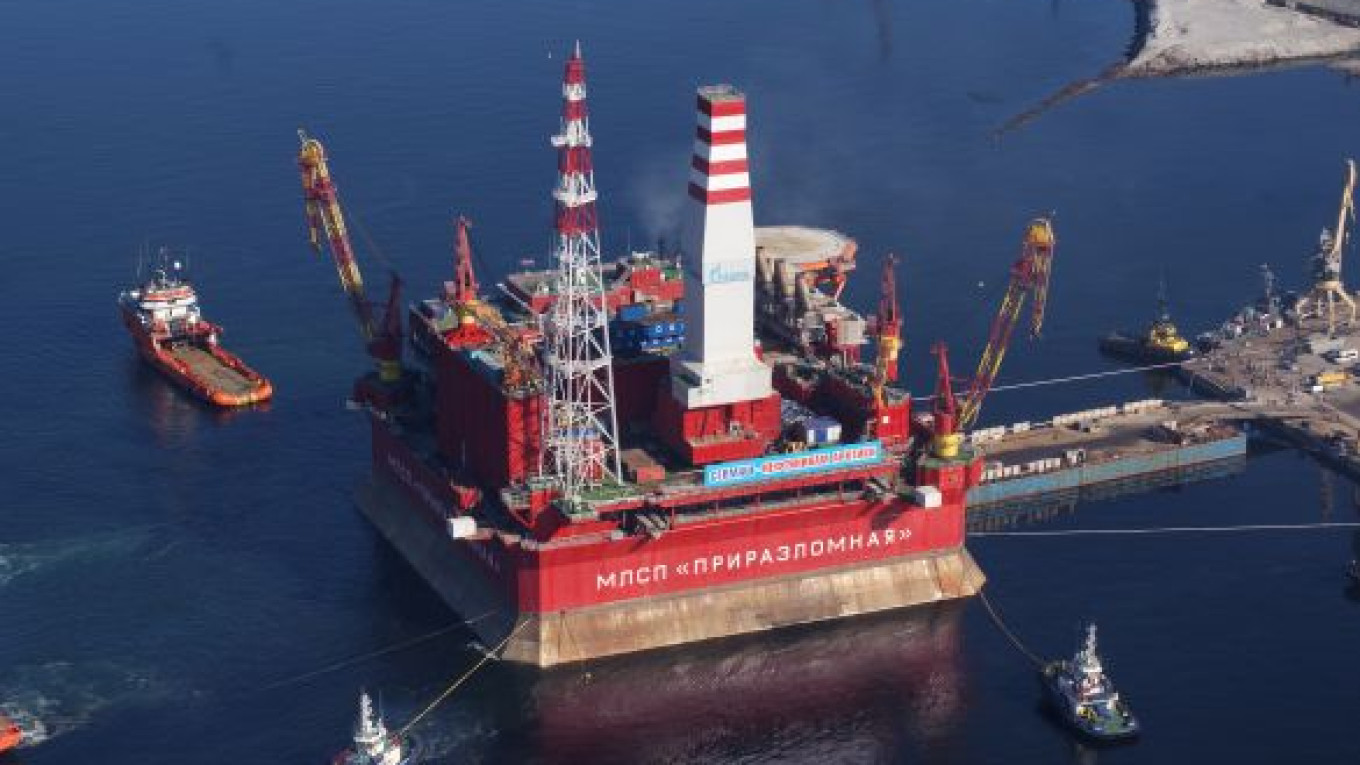A Gazprom platform set off? Thursday from a Murmansk port, launching an Arctic oil exploration effort whose success will be vital to sustaining Russia's long-term status as the world's top oil producer.
Russia's first ice-resistant offshore production platform, a vessel of 117,000 deadweight tons, is due to arrive at its designated location in the Pechora Sea within 10 days and start drilling in the Prirazlomnoye field.
Russia's gas export monopoly has been mulling the Arctic project for years and has postponed its launch several times. Earlier this week, the platform's builder, Sevmash, announced the latest target date for the start of production.
Gazprom plans to start production there in the first quarter of 2012, a spokesman said. That puts it ahead of Russia's largest oil firm, Rosneft, whose deal to explore for oil with BP in the Kara Sea collapsed earlier this year.
It seeks peak production at Prirazlomnoye, with estimated reserves of 526 million barrels, or 120,000 barrels per day within several years. Media reports have put total investments at about $4 billion.
Oil will be extracted from the deposit some 60 kilometers offshore, where winter temperatures often plunge below minus 50 degrees Celsius, and then pumped to tankers.
The focus of oil and gas companies has shifted to the Arctic after several huge discoveries, including finds by Norway's Statoil in the Norwegian waters of the Barents Sea.
Moscow and Oslo recently settled a 40-year-old maritime border dispute, opening the way for further exploration in the area.
Russia, which has granted an offshore duopoly to Gazprom and Rosneft, wants to sustain oil production above 10 million barrels per day over the next decade by tapping new fields in remote Eastern Siberia and the Arctic.
According to the Natural Resources Ministry, Russia's total offshore hydrocarbon resources are estimated at more than 100 billion tons of oil equivalent.
Prime Minister Vladimir Putin has said the country will need to invest more than $300 billion to keep pumping oil at current levels through 2020. The Energy Ministry has warned that output could fall 20 percent without significant upstream efforts.
Gazprom, whose wholly controlled subsidiary, Gazprom Neft Shelf, formerly known as Sevmorneftegaz, owns the license for Prirazlomnoye, initially indicated that it could develop the field jointly with foreign partners, but has since said it would do it alone.
The Russian gas giant is also involved in the Shtokman gas project in the Barents Sea, where natural gas is expected to start flowing in 2016. Gazprom is partnering with Total of France and Statoil on Shtokman.
A Message from The Moscow Times:
Dear readers,
We are facing unprecedented challenges. Russia's Prosecutor General's Office has designated The Moscow Times as an "undesirable" organization, criminalizing our work and putting our staff at risk of prosecution. This follows our earlier unjust labeling as a "foreign agent."
These actions are direct attempts to silence independent journalism in Russia. The authorities claim our work "discredits the decisions of the Russian leadership." We see things differently: we strive to provide accurate, unbiased reporting on Russia.
We, the journalists of The Moscow Times, refuse to be silenced. But to continue our work, we need your help.
Your support, no matter how small, makes a world of difference. If you can, please support us monthly starting from just $2. It's quick to set up, and every contribution makes a significant impact.
By supporting The Moscow Times, you're defending open, independent journalism in the face of repression. Thank you for standing with us.
Remind me later.


